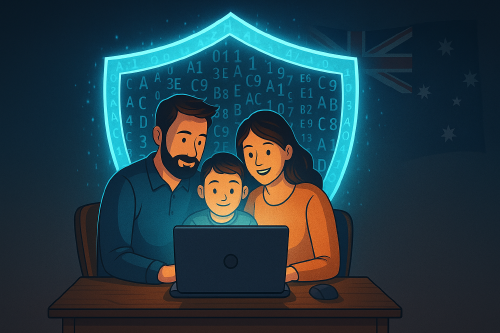This article is part of a series.
- The Cyber Crime Awareness Series – What You Don’t Know Can Hurt You
- Part 1: Cyber Crime is Booming in Australia
- Part 2: Don’t Click That Link!
- Part 3: Digital Arrests, Loan App Blackmail & High-Stakes Scams Targeting Australians
- Part 4: Your OTP Isn’t Safe
- Part 5: The Price of Free
- Part 6: Inside the Dark Web
- Part 7: Digital Detectives
- Part 8: Cyber Security Toolkit
🛡️ Your Personal Cybersecurity Toolkit – Protecting Yourself and Your Family

Cyber crime isn’t a distant threat — it’s in your pocket, your apps, and sometimes even your own habits. After exploring the traps, scams, and sophisticated attacks throughout this series, this post focuses on what you can do today to defend yourself and those around you.
This isn’t about fear — it’s about taking control with practical steps and real-world awareness.
🔐 Start with Digital Hygiene – The Basics You Can’t Skip
Even the most advanced users fall victim to basic mistakes. These steps may seem simple, but they create a strong foundation.
- Use strong, unique passwords for every account. A password manager helps.
- Enable Two-Factor Authentication (2FA) wherever possible — especially on email, banking, and social media.
- Update software regularly — yes, even that annoying phone update. It patches known security holes.
- Back up important data to an encrypted cloud or offline drive.
🧠 Pro tip: Assume your data can and will be stolen — your job is to make it useless or unrewarding to attackers.
🧾 Be Skeptical of QR Codes, Links & Attachments
From shopping centres to parking lots, QR codes are everywhere. So are fake links in emails, SMS, or WhatsApp.
- Never scan a QR code from an untrusted source. Criminals use stickers over legitimate ones.
- Hover over links before clicking (especially on desktop). Check the domain spelling.
- Watch out for urgency: “Act now,” “limited time,” or fear-inducing prompts are classic traps.
🎯 A tip from victims: “It looked official — but I was rushed.” Always take a breath before reacting.
📱 Be App-Aware – Because That’s Where the Leaks Begin
Free apps are often free because you’re the product.
- Avoid apps with excessive permissions (e.g., a flashlight app requesting contacts).
- Delete apps you don’t use — even unused apps can leak data.
- Watch out for loan apps, dating platforms, or “games” that enable chat with strangers.
- Only download from official stores — and even then, check the reviews.
🧪 Sandbox tools like “Mobi Armour” can help you test links, apps, and permissions before fully trusting them.
🧠 Check for Data Leaks – Stay Ahead of Criminals
Assume your personal data has leaked — but don’t panic.
- Use websites like haveibeenpwned.com to check if your email or phone number has been breached.
- Monitor your credit file regularly (free with Equifax or illion in Australia).
- Set up alerts on your bank account for new payees or overseas transactions.
- Turn off autofill for sensitive fields like card numbers and passwords.
💬 “I didn’t know my data was leaked until I checked — and I changed all my passwords the same night.”
🚨 What to Do if You’re a Victim — Act Fast, Buy Time
If you suspect you’ve been scammed:
- Call 1800 123 400 (Australia’s cybercrime hotline) or report via cyber.gov.au.
- Immediately call your bank and request a line marking — this temporarily freezes funds in the recipient account.
- Inform your mobile provider if your number may be compromised.
- Keep all evidence — screenshots, call logs, messages. You’ll need it for police or cyber cell reports.
- Visit a Cyber Cell station if available — better equipped than local police.
🧯 Time is critical. The sooner you act, the better your chance of recovery.
👥 Make Cyber Awareness a Shared Responsibility
Cyber criminals often count on you being isolated, confused, or unaware. Sharing what you know can be a powerful defense.
- Teach your kids about online safety in non-scary, honest terms.
- Help your parents/grandparents recognise scam calls and popups.
- Encourage friends to enable 2FA and check their data exposure.
🛡️ The more people know — the less room criminals have to operate.
📘 Final Thoughts: Security Isn’t Paranoia — It’s Protection
Cyber security doesn’t mean locking yourself away from the digital world. It means navigating it smarter.
This post is your toolkit. You don’t need to implement everything overnight — but each small step makes a big difference. Because at the end of the day, you’re your best firewall.
📚 References
- ACSC Essential Eight
- Mobi Armour – Mobile Threat Defence (Australia-based)
- Scamwatch Australia
- IDCARE – Australia & NZ identity theft support service
- HaveIBeenPwned.com
- Personal case feedback from cybercrime forums and community groups
This article is part of a series.
- The Cyber Crime Awareness Series – What You Don’t Know Can Hurt You
- Part 1: Cyber Crime is Booming in Australia
- Part 2: Don’t Click That Link!
- Part 3: Digital Arrests, Loan App Blackmail & High-Stakes Scams Targeting Australians
- Part 4: Your OTP Isn’t Safe
- Part 5: The Price of Free
- Part 6: Inside the Dark Web
- Part 7: Digital Detectives
- Part 8: Cyber Security Toolkit